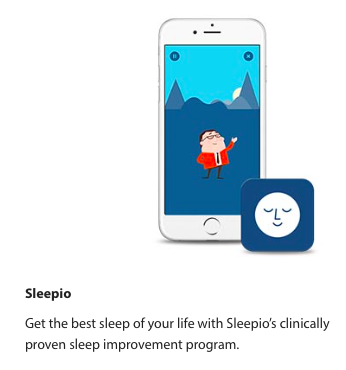
Above is an image of a Jawbone email, advertising some new products in their space. Of particular interest was Sleepio, a company that runs a sleep improvement program.
I visited their website, and was welcomed with:
Can we help you sleep better?
The site welcomes you to take a quick survery about your sleep, and in my opinion ask the correct questions about the status of your sleep. Questions like how long it takes for you to fall asleep, or whether you feel restless at night. After some numbers crunching, the Sleepio surveymonkey appears to phenotype your sleep profile, and compute whether it’s product will help you:
We have helped 69% of people with sleep like yours improve their sleep.
The Sleepio product is based on something called cognitive behavioral therapy. In this instance, the therapy aims to break a presumed bad cycle of negative sleep thoughts leading to negative emotions regarding sleep, which inevitably result in poor sleep behaviors. Of course, this will only work to the extent that there isn’t an underlying physiological reason for poor sleep (e.g. sleep apnea, or a truly unique melantonin brain circuit).
The product consists of 6 or so online weekly therapy sessions, that first suggest practical lifestyle changes to improve your sleep. Something like, turn off all the lights before you sleep. Next the sessions give participants strategies for breaking the association of negative emotions with sleep.
Up to now this all sounds like psychotherapy. But here’s where technology comes in: you can use the Jawbone up to track your progress. For the first, you have some feedback on your performance that you cant track alongside your lifestyle adjustments. This sounds simple enough to try before resorting to pharmacological interventions.
